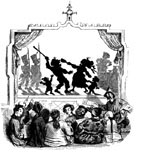
“On This Rock I Will Build My Celebration Center”
GUEST COLUMN
The highway signboard informs passing motorists that “It’s Not Religion… It’s a Relationship.” The “It,” presumably, is Christianity, although one can never be sure when attempting to decode the evangelical Protestant language-revisers.
To the detriment of precision of expression, English has undergone a steady deterioration from the specific to the vague. In the romantic context, “relationship” long ago replaced the old “going together” or “being in love.” Likewise, one’s “relationship with Christ” has edged out “faith” as the preferred terminology among certain evangelical groups.
Insofar as it refers to the need for a personal faith in Jesus Christ, “relationship” has value. Trouble is, relationships tend to come and go, run hot and cold. Our connection with the Lord is supposed to be made of sterner stuff — such as “all” our heart, mind, soul, and strength.
In some Christian communities, the very language of faith has been transformed to better fit with modern tastes. Despite its many good points, the Protestant charismatic renewal, which is not noted for its historical memory, has tended to look at what came before it as hopelessly out of date and not pertinent to contemporary wants and needs.
“Religion,” as the signboard indicated, is one of the forbidden words. It’s too closely associated with your parents’ stuffy old church and structured ways of worship — like singing out of hymnals (or singing real hymns for that matter) and following a prescribed order of service.
The flight from “religion” by the marketeers of evangelicalism would have astonished St. James, who had a few things to say in his epistle about “religion that is pure and undefiled before God” (1:27).
You May Also Enjoy
Contrary to Francis’s vision, cutting off the old liturgy does not promote unity in the Church. Vatican II did not envision excising the old branch from the tree.
If liturgical music returns to praising and glorifying God, our focus has a better chance of returning to the Eucharist and the Word.
A renewal of the Lord’s Day would have us finding so many things worth doing for their own sake that we couldn’t be bothered to do ordinary, non-spiritual work.

